
Carrie Chapman Catt was an American women's suffrage leader who campaigned for the Nineteenth Amendment to the United States Constitution, which gave U.S. women the right to vote in 1920. Catt served as president of the National American Woman Suffrage Association from 1900 to 1904 and 1915 to 1920. She founded the League of Women Voters in 1920 and the International Woman Suffrage Alliance in 1904, which was later named International Alliance of Women. She "led an army of voteless women in 1919 to pressure Congress to pass the constitutional amendment giving them the right to vote and convinced state legislatures to ratify it in 1920". She "was one of the best-known women in the United States in the first half of the twentieth century and was on all lists of famous American women."

Martha Carey Thomas was an American educator, suffragist, and linguist. She was the second president of Bryn Mawr College, a women's liberal arts college in Bryn Mawr, Pennsylvania.
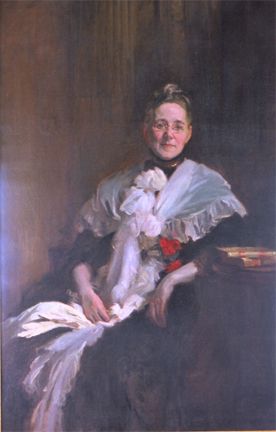
Mary Elizabeth Garrett was an American suffragist and philanthropist. She was the youngest child and only daughter of John W. Garrett, a philanthropist and president of the Baltimore and Ohio Railroad.

Susan Grimes Walker is best known for her long commitment to women's suffrage, and for her involvement in progressive political organizations. In 1923, she became one of the first two women elected to the Massachusetts House of Representatives.
Anne Lee Delano was a prominent figure in the history of collegiate and international women's field hockey and women's lacrosse. She was both an honored participant, coach, author and association official.

The College Equal Suffrage League (CESL) was an American woman suffrage organization founded in 1900 by Maud Wood Park and Inez Haynes Irwin, as a way to attract younger Americans to the women's rights movement. The League spurred the creation of college branches around the country and influenced the actions of other prominent groups such as National American Woman Suffrage Association (NAWSA).

Valeria Hopkins Parker was an American physician and suffragette. A governor appointee as director of the Connecticut State Farm for Women (1919), she was the first "woman policeman ever to be given supervision over state policemen in the US", these being policewomen who supervised girls in the New London, Connecticut area. Among her other achievements, she was also the Executive Secretary of the US Interdepartmental Social Hygiene Board.
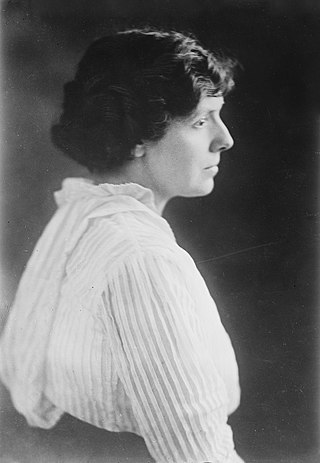
Antoinette Funk was a lawyer and women's rights advocate during the 20th century. She served as the executive secretary of the Congressional Committee of the National American Woman Suffrage Association.
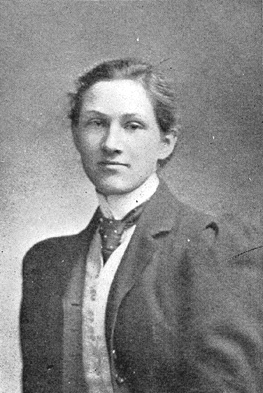
Edith Houghton Hooker was an American suffragist and social worker. She was a leader of the suffrage movement in Maryland in the early twentieth century and was posthumously inducted into the Maryland Women's Hall of Fame. She was a maternal aunt of actress Katharine Hepburn.

Alda Heaton Wilson (1873–1960) was an architect and civil engineer from Iowa. She and her sister Elmina were the first American women to practice civil engineering after obtaining a four-year degree. She worked as a freelance architect in Illinois, Iowa and Missouri before moving to New York and working there for over a decade. She was the first woman supervisor of the women's drafting department of the Iowa Highway Commission. In her later career, she curtailed her architectural works, becoming the secretary, housemate and traveling companion of Carrie Chapman Catt.
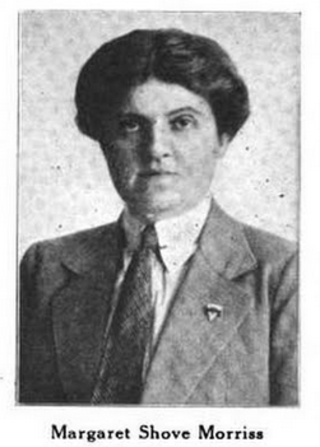
Margaret Shove Morriss was an American academic historian, She was the Dean of Women in charge of Pembroke College in Brown University from 1923 to 1950.

Elizabeth King Ellicott (1858–1914) was an American suffragist.
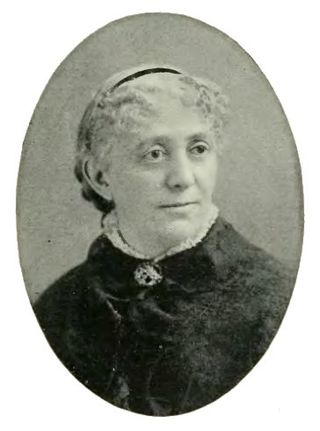
Mary Newbury Adams was an American women's suffragist and education advocate. She was a major social and political activist, and she helped found the Iowa Federation of Women's Clubs and the Northern Iowa Suffrage Association. Adams was inducted into the Iowa Women's Hall of Fame in 1981.

Katrina Brandes Ely Tiffany was an American suffragist and philanthropist, from a prominent Philadelphia family.
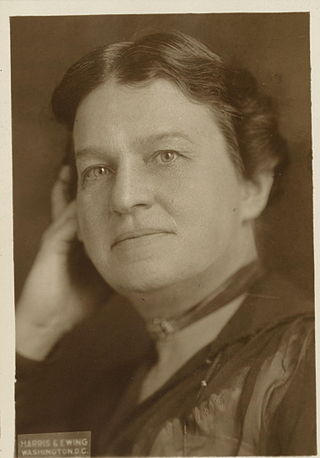
Ella Riegel was an American suffragist and women's rights activist. Riegel was a graduate of the first class of Bryn Mawr College and would remain associated with the college the rest of her life.

The Men's League, made up of groups known variously as the Men's Equal Suffrage League, Men's League for Woman Suffrage, or National Men's League for Woman Suffrage, was an American men's women's suffrage organization formed by several suffragists in New York. The group was based on the idea of the British Men's League for Woman Suffrage. In the early 1900s, Oswald Garrison Villard and Anna Howard Shaw were in contact with one another regarding the creation of a group of prominent men to support women's suffrage efforts. Villard recruited Max Eastman and Stephen S. Wise to help with the project. Later, James Lees Laidlaw became the president and helped spread the concept of the group around the United States. Some colleges, like Harvard University and Swarthmore College, also had their own Men's League groups.

Alice P. Gannett was an American settlement house worker and social reformer. The Goodrich-Gannett Neighborhood Center in Cleveland, Ohio, is named in her honor.

Martha Gibbons Thomas was an American politician, suffragist, and dairy farmer from Chester County. She became one of the first women elected to the Pennsylvania House of Representatives, belonging to a cohort of eight women representatives elected in 1922. Thomas won reelection in 1924. She did not seek a third term.

Mary Hall Ingham (1866–1937) was an American suffragist and reformer. She was the chair of the Pennsylvania branch of the National Woman's Party. She picketed the White House as a part of the Silent Sentinels, was arrested, and spent time in the Occoquan Workhouse. She worked to secure the ratification of the 19th Amendment by the Pennsylvania legislature and fought for the Equal Rights Amendment. She founded the Equal Franchise Society of Philadelphia and was director of Philadelphia's Bureau of Municipal Research and the Octavia Hill Association. Ingham attended the Woman's Medical College of Pennsylvania, Bryn Mawr College, and Radcliffe College.

















